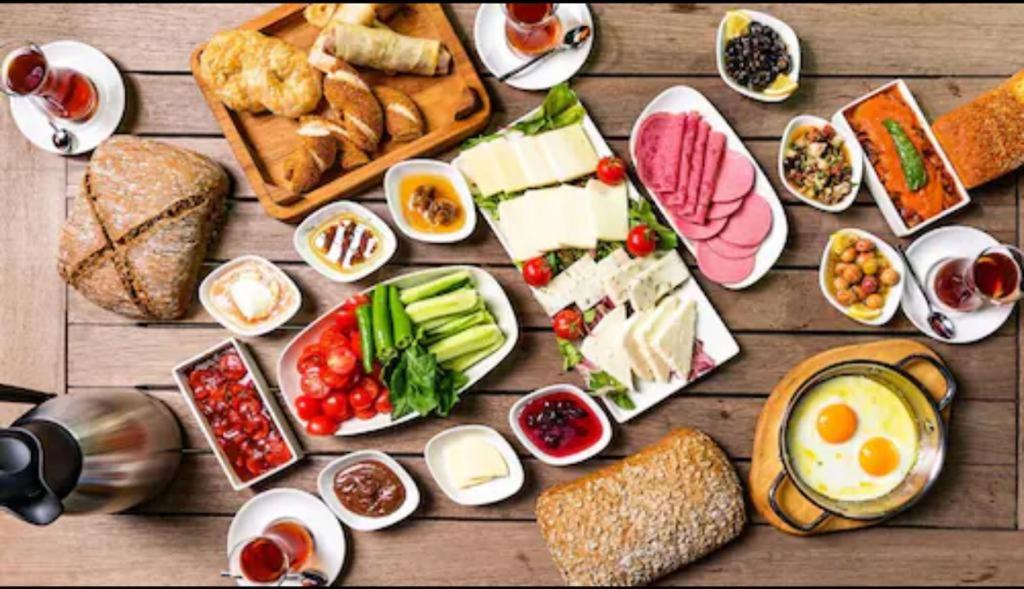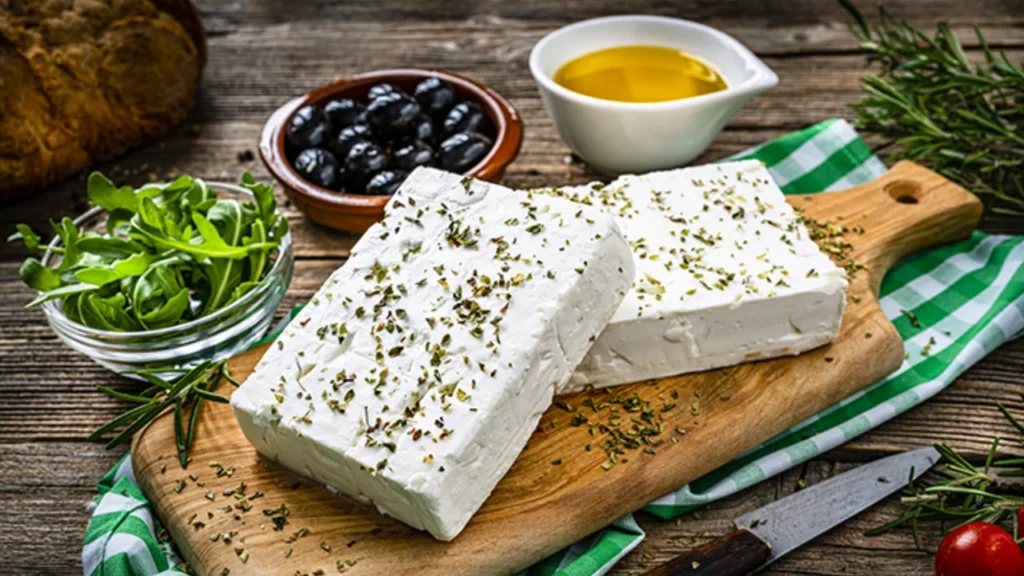Breakfast in Turkish culture is much more than just enjoying a meal; it is a broad event that directs attention to the country’s glorious cultural treasury.
The journey shows how integral breakfast is in the lives of the Turks, regarding their history, the main ingredients it is built on, and their nutritious values.
In this article, you will learn about popular dishes in traditional Turkish breakfast, the traditions and customs concerning this meal, and some helpful hints on how to prepare traditional Turkish breakfast.
Key Takeaways
- Cultural Significance: Turkish breakfast-in Turkish, “kahvaltı”-is not just a meal; it is a cultural activity close to the hearts of Turks that brings people together, creating community and bonding among family members.
- Rich in History: The breakfast culture originally started in the Ottoman Empire and has been influenced by cuisines of the Mediterranean, Middle Eastern, and Central Asia.
- Variety in Dishes: It usually consists of just about everything: varieties of bread, varieties of cheese, eggs, menemen, a dish of eggs, tomatoes, peppers, and spices, and spicy Turkish sausage known as sucuk.
- Nutritional Value: The typical Turkish breakfast is nutritionally balanced due to its component foods; it supplies healthy fats, proteins, and vitamins.
- Traditional Taste: Cazbar Restaurant reproduces the authentic taste of a Turkish breakfast in Baltimore, presenting the true taste of Turkey on your table.
Table of Contents
ToggleThe Importance of Breakfast in Turkish Culture


Breakfast is a big deal in Turkish culture and is usually known as ‘kahvaltı’, which means ‘before coffee’. This meal is way beyond just eating food, but it’s a reflection of significant heritage and traditions that bring people together around the table, thus helping in communal bonding and sharing culture.
This liveliness of dishes and the way hospitality is shown to guests reflects the deep cultural heritage and social values of Turkey. The meal shared this way relieves the bonding pressures, hence cherished in everyday life, especially when the family members come together or at some social gatherings.
History and Cultural Significance
The origin of Turkish breakfast can be traced to centuries of culinary evolution shaped by different regions and cultures that have influenced Turkey’s gastronomic landscape. This meal, termed ‘kahvaltı’, serves as a base for this rich tapestry of flavors and textures.
Its roots go back to the most extravagant feasts of the Ottoman Empire, where an elaborate breakfast arrangement would display a variation of locally available foods. The Mediterranean, Middle Eastern, and Central Asian cuisines contributed a number of spices, types of cheese, and bread to create a mosaic of flavors that speak of Turkey’s dynamic history.
Further reading: 12 Must-Try Popular Turkish Foods You Can’t Miss
Key Ingredients in a Traditional Turkish Breakfast
A traditional Turkish breakfast is a diverse array of key ingredients that highlight the region’s rich agricultural practices and artisanal food culture. This spread typically includes items such as:
- simit
- olives
- feta cheese
- seasonal fruits
Overview and Nutritional Benefits
The most striking nutritional benefits of Turkish Breakfasts are that, due to the variety in components and flavors, they normally propose a good balance between healthy fats, proteins, and essential vitamins.
This meal also often includes olives, which are an excellent source of monounsaturated fats said to benefit heart health, as well as various kinds of cheese that add calcium and protein, required for strong bones and muscle health. Also, fresh vegetables like tomatoes and cucumbers add essential vitamins and antioxidants, promoting overall well-being.
Each element is not only pleasing to the palate with its own taste but also meets the nutritional needs of the body. This means that this variety should be brought into daily diets for the sustenance of health in the long run.
Typical Turkish Breakfast Dishes
A typical Turkish breakfast features a delightful array of flavors and textures and usually consists of:
1. Bread


Bread is the basis of a Turkish breakfast, usually warm and freshly baked. The most common types are “simit,” a ring-shaped bread with sesame crust, or “pide,” which is a soft flatbread. Both are perfect for dipping into the variety of spreads and other foods that accompany them.
2. Spreads


Spreads add a burst of flavor to the breakfast table. Favorites include “bal kaymak,” a rich combination of honey and clotted cream, as well as “tahini pekmez,” a blend of tahini and grape molasses. Jams, olives, and butter also commonly used as spread on the bread.
3. Cheese


There is always a variety of cheeses; the most common are “beyaz peynir” and “kaşar”, which is semi-hard, and the former is much like feta. These cheeses offer a creamy, salty contrast to the sweet and savory components of this breakfast.
4. Egg
Eggs are versatile and usually served boiled or well-fried within the Turkish breakfast. They could be plain or, in some cases, used in menemen dishes for that added egg protein satisfaction in the meal.
5. Menemen


Menemen is a popular Turkish meal prepared through scrambled eggs cooked with tomatoes, green peppers, and spices. This is a heavy and flavorful option, great to be sopped up with bread.
6. Turkish Sausage


Sucuk is a spicy Turkish sausage, adds an audacious, smoky taste to the breakfast table. It is mostly cut into thin slices and fried; it goes extremely well with eggs or alone as a strong kick-off in the morning.
Traditions and Customs Surrounding Turkish Breakfast
The Turkish breakfast etiquette and hospitality are steeped in tradition and custom. More than just a relief of the need for food, eating together generally becomes a valued ritual and social bonding that also brings into relief the hospitality of the Turks.
Etiquette and Social Aspects
Grasping etiquette and social elements is valuable because it underlines the greater breakfast culture of Turkey where eating together and sharing food plays an important role in nurturing relationships.
It is usually a meal eaten at one’s pace, where family and friends converge for a generous serving with delightful offerings. Dinners commonly savor many varieties of cheese, olives, bread, and fresh vegetables, combined with aromatic teas that enhance social behavior.
The hosts will make sure that everyone is well-fed, and many a time, hosts invite their guests to taste a bit of each dish. Sharing conversations and sometimes plates makes the act of eating much more fertile ground on which relationships are formed bringing out the fact that breakfast is not about having something in one’s stomach but a way to celebrate connection and culture from the heart.
How to Prepare a Traditional Turkish Breakfast
Traditional Turkish breakfast requires a selection of fresh foods together with appropriate recipes and tips for enjoying an excellent dining experience. Presentation-wise, it is considered that the presentation of the food is as important as the flavors themselves.
Tips for an Authentic Breakfast Experience
The usage of utensils and ingredients from the locality shows the true essence of a Turkish breakfast at the table.
To make an authentic Turkish breakfast, include some classic dishes like menemen, a mouth-watering scrambled egg concoction with tomatoes and peppers-along with a colorful array of olives, feta cheese, and honey.
Using vibrantly colored ceramic plates or a brass sophisticated teapot can further enhance the presentation, reflecting the rich history of Turkish culture.
Further reading: What Is Mezze? The History and Top Dishes You Must Try
Where to Enjoy the Best Traditional Turkish Breakfast?


If you want to have an authentic traditional Turkish breakfast, head to Cazbar Restaurant in Baltimore. Cazbar treats the diner to a meal of pomp, embellished with all the accouterments of a classic Turkish breakfast. Great devotion to authentic Turkish cuisine is there to make every taste of their dishes take you into the core of Türkiye. Cazbar is the best place to visit to do your morning ritual!
Conclusion
A traditional Turkish breakfast is colorful and full of flavor. It represents the rich cultural and culinary heritage of Turkey. From the food being shared to the variety that gives one a balanced nutrition, true representation of the Turkish tradition of hospitality. Whether you make it at home or venture out to an authentic restaurant like Cazbar, having a Turkish breakfast is a divine excursion into one of Turkey’s favorite food traditions.
Frequently Asked Questions
What is a traditional Turkish breakfast?
A traditional Turkish breakfast is a meal typically eaten in the morning that consists of a variety of savory and sweet dishes, such as cheeses, breads, and pastries.
What are the key ingredients in a traditional Turkish breakfast?
The key ingredients in a traditional Turkish breakfast can vary, but typically include items such as feta cheese, sausages, eggs, and various types of breads, such as simit or pide.
What are some unique dishes that are commonly found in a traditional Turkish breakfast?
Some unique dishes that are commonly found in a traditional Turkish breakfast include menemen (scrambled eggs with vegetables), sucuk (spicy sausage), and börek (savory pastries filled with cheese, meat, or vegetables).
What are some common traditions associated with a traditional Turkish breakfast?
One common tradition associated with a traditional Turkish breakfast is the concept of sharing food with others. It is often seen as a social meal, where friends and family gather and enjoy each other’s company over a table filled with various dishes.
Is there a specific way to serve and eat a traditional Turkish breakfast?
Yes, there is a specific way to serve and eat a traditional Turkish breakfast. The dishes are typically placed on a large tray or table in the middle of the group and everyone helps themselves. It is also common to eat with your hands, using bread to scoop up the various dishes.
Are there any health benefits associated with a traditional Turkish breakfast?
Yes, a traditional Turkish breakfast can have many health benefits. The variety of dishes, including fresh vegetables, fruits, and proteins, provide a well-rounded and nutritious meal. Additionally, the social aspect of a Turkish breakfast can have positive effects on mental health and well-being.







